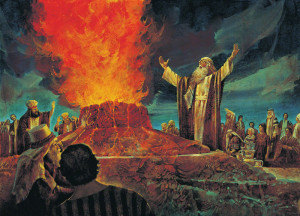The Rise and Fall of Biblical Theology

“Modern exegetes are like us. They work and think at the end of a history. In this sense, the one thing that would be criticisable would be the naive claim of an exegesis that held itself to be without a history, as though it were possible to coincide, without the mediation of a tradition of reading, with the original signification of a text, even with the presumed intention of its author.” – Paul Ricoeur [1]
Their aims were noble: to throw off the shackles of church-imposed doctrine and read the Bible afresh on its own terms; to do theology that was truly biblical, built on the foundations of pure, unadulterated exegesis of Scripture. But what non-biblical assumptions lurked unnoticed in the background of this enterprise?
1. Its Birth and Goals
In the 1940s the Biblical Theology movement grew rapidly. Its proponents were characterised by the following distinctives:
- They focused on history (the particulars of what happened) as more important than ontology (generalisations about the way things are).
- They distinguished between Greek and Hebrew ways of thinking (Greek = bad, polluting influence; Hebrew = good, original & authentically biblical).
- They insisted on the Bible’s own understanding of itself as the only foundation for theology. They rejected any use of external philosophical or theological categories – either from the church or from the modern world – imposed on the Bible to help understand it.
- They practised exegesis using secular tools of historical criticism, developed in Germany in the 18th and 19th centuries.
Pointing out that the majority of the Bible is historical narrative, these theologians made fresh and exciting discoveries about the theology implied in the story of Scripture. They avoided abstract speculations about “who/what God is” and focused instead the God revealed through his “mighty acts in history.” If God had wanted us to have a systematic theology book, he would have given us one; but he gave us a history book.
2. Some Problems
“There is an ugly, broad ditch between history and theology.” – Gotthold Lessing
There is much richness in what the biblical theologians uncovered, and we owe them a lot for their insights into the narrative-historical nature of the Bible. But over time they ran into increasing problems, not least that no two biblical theologians could agree on the conclusions of their research. In the 1960s their project eventually became unstuck, falling apart under the force of strong criticisms to which it had no response.

First, it is contradictory to say that history is more fundamental than ontology, because this insistence is itself an ontological assertion (i.e. a generalisation about the way thing are), which proves that you cannot avoid doing ontology whether or not you’re aware of doing it. Likewise in their rejection of church-imposed dogmatic categories they failed to notice that the Bible is itself a dogmatic category: otherwise why would you care what it said more than any other historical document? It is only by trusting the church that we pay any attention to the Bible.[2]
Second, it is contradictory to reject “external” philosophical/theological methods of interpretation and then interpret the Bible using secular historical criticism, with all of its assumptions about what history is and how human beings participate in it.
Third, it is impossible to think like a first century Hebrew unless you are one. We cannot help but begin the process of ‘understanding’ from our own cultural backdrop. As James Barr put it, “The use of concepts and categories taken from ‘without’ the Bible is both natural and necessary,” – the most basic being the use of a modern grammar book and lexicon to help us understand the Greek of the New Testament.[3]
Perhaps the strongest criticism of the biblical theologians is just that they were trying to do something impossible, based on a flawed understanding of both what a text is and how knowledge works. Knowledge is never in the abstract: it always belongs to a knowing subject, someone who ‘knows’ in a particular way based on their personal life experience. As Bernard Lonergan said,
The ‘principle of the empty head’ bids the interpreter forget his own views, look at what is out there, let the author interpret himself. In fact, what is out there? There is just a series of signs. Anything over and above a re-issue of the same signs in the same order will be mediated by the experience, intelligence, and judgment of the interpreter.[4]
In order for a text to be treated as more than a brute artefact, it must be seen as communicating knowledge from one person to another, bridging the divide between two life-experiences. But this means that the reader contributes as much of the text’s ‘meaning’ as the author does: meaning is not a one-way street.[5]
3. Conclusion: Moving Forward
“Some … are under the misimpression that having a definitive revelation is the same thing as having a definitive understanding of that revelation.”[6]
The Bible can never be read “on its own terms” as if we, the readers, had no perspective but were simply reading from a neutral point of view. To confuse “the facts” with “my perspective on the facts” is to be like a little child who thinks that they can hide in the middle of a room by closing their eyes. If I close my eyes, nobody can see me, right? Nobody can escape their own particular way of seeing the world, and that includes reading and understanding a text. But this isn’t a bad thing; it is part of our created nature and the way God meant things to be.
Biblical theology has many penetrating insights to help us understand Scripture. But it is not enough by itself: it falls apart without the guiding framework of the church’s theological categories. Just as for the apostle Paul, to be a slave to Christ meant to be truly free, so it seems that the “shackles of church dogma” are the only way our understanding of God can truly flourish.
Further Reading
Barr, James. The Concept of Biblical Theology: An Old Testament Perspective. Minneapolis: Fortress Press, 1999.
Brueggemann, Walter. Theology of the Old Testament: Testimony, Dispute, Advocacy. Minneapolis: Fortress Press, 1997.
Childs, Brevard S. Introduction to the Old Testament as Scripture. 1st American ed. Philadelphia: Fortress Press, 1979.
Ebeling, Gerhard. “The Meaning of ‘Biblical Theology.’” The Journal of Theological Studies VI, no. 2 (1955): 210–25.
Gnuse, R. K. Heilsgeschichte as a Model for Biblical Theology: The Debate Concerning the Uniqueness and Significance of Israel’s Worldview. Lanham, Md: University Press of America, 1989.
Ollenburger, Ben C. The Flowering of Old Testament Theology: A Reader in Twentieth-Century Old Testament Theology, 1930-1990. Winona Lake, Ind: Eisenbrauns, 1991.
[1] André LaCocque and Paul Ricoeur, Thinking Biblically: Exegetical and Hermeneutical Studies (Chicago ;London: University of Chicago Press, 1998), 332.
[2] The overly simple distinction between “Greek” and “Hebrew” thinking also came under attack as an unwarranted ontological categorisation. I have written elsewhere on this topic.
[3] Cited in Anthony C. Thiselton, The Two Horizons: New Testament Hermeneutics and Philosophical Description with Special Reference to Heidegger, Bultmann, Gadamer, and Wittgenstein, 1st American ed (Grand Rapids, Mich: Eerdmans, 1980), 9.
[4] Bernard Lonergan, Method in Theology (Toronto: University of Toronto Press, 1972), 157.
[5] I have written elsewhere on this too.
[6] Kevin J. Vanhoozer, “A Response to William J. Webb,” in Four Views on Moving Beyond the Bible to Theology, ed. Gary T. Meadors, 1 edition (Zondervan, 2009), 263.
Barney
Latest posts by Barney (see all)
- The Nicene Creed: “One Church” - July 14, 2016
- The Nicene Creed: “…for us and for our salvation…” - June 24, 2016
- Pacifism and Politics: The Tank and the Letter - May 3, 2016

